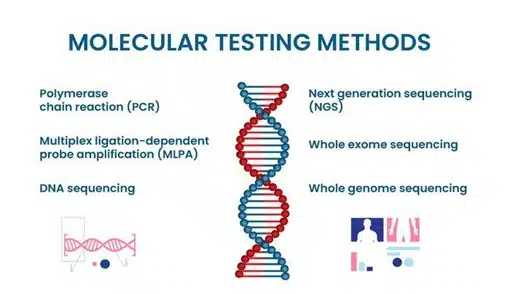What are the different types of molecular or genetic tests?

In the field of medicine and scientific research, molecular testing or genetic testing is the new buzzword.
- What is genetic testing?
- What are the types of genetic testing methods?
In this article, the experts at Helvetica Health Care (HHC) give you the lowdown on everything you need to know about molecular testing by answering these vital questions.
What is molecular or genetic testing?
Genetic testing is expanding rapidly and is used widely today in the detection of many diseases such as cancer. Genetic testing methods can analyse changes in chromosomes, proteins or genes. It is important to note that molecular testing is only one of the three categories that fall under genetic testing, the other two being cytogenetic and biochemical testing. In principle, cytogenetic testing can detect abnormalities in chromosome structure, biochemical testing detects abnormalities in a protein function, and molecular testing identifies abnormalities in DNA sequence. The method of testing used will depend on the kind of anomaly being measured.
Here, we focus on molecular testing.
Chromosomes are made up of DNA. Genes are specific DNA segments that act as templates to produce RNA. Molecular testing, also known as DNA sequencing, establishes the arrangement of DNA building blocks (nucleotides) in a person’s genetic code. To what end? To identify genetic variations. Genetic variations, variants or mutations are genetic modifications that can affect the body in different ways. While most have little or no impact on a person’s health, they can occasionally be linked to disease.
When choosing a suitable test, a doctor will consider several variables, such as the suspected condition or conditions and the genetic variations frequently linked to those conditions. A test that examines numerous genes or chromosomes may be done if a diagnosis is not apparent. A more targeted test could be performed if a specific ailment is present.
What are the types of molecular testing methods?
The field of molecular diagnostics comprises the following methods.
Polymerase chain reaction (PCR)
PCR is a common method used widely to combat the recent Covid-19 pandemic. PCR is based on “amplifying” DNA; it makes several copies of short DNA sections from a tiny sample of genetic material. PCR makes finding or measuring specific genes or areas of interest possible. DNA is frequently copied using this procedure to be sequenced or examined using other methods. It is frequently employed to aid in the search for genetic variations known to cause certain diseases, such as those linked to cancer or genetic disorders.
Multiplex Ligation-Dependent Probe Amplification (MLPA)
MLPA is a PCR test that enables the amplification of multiple targeted sections of DNA and allows specific sequence deletions and duplications to be detected.
DNA Sequencing
DNA sequencing determines the order of bases that make up DNA, such as adenine (A), cytosine (C), thymine (T) and guanine (G)]. With the help of DNA sequencing, clinicians can determine if any variants or mutations are present in a gene or the region that regulates a gene linked to a disease.
DNA sequencing comprises two methods
Sanger sequencing (single gene)
Sanger sequencing is the gold-standard technique for clinical DNA sequencing that examines one or more genes at a time. This reliable technique is based on a unique chemical that labels each DNA nucleotide with a specific fluorescent dye, depending on whether an A, T, C, or G base is present. Although, it can only read one short section of DNA at a time from a single patient. While it is highly effective, it took over ten years to complete the sequence of a single human using a technique like this under the Human Genome Project.
Next-generation sequencing (NGS)
A new-age molecular diagnostic test, the NGS represents a collection of next-gen technologies that enable faster sequencing as they can sequence millions of tiny DNA fragments at the same time.
Whole genome sequencing
Whole genome sequencing is an NGS analysis of an individual’s complete DNA. The genome comprises all the genes, their coding and non-coding regions, and the spaces between them.
Whole exome sequencing
Whole exome sequencing is an NGS analysis of all the protein-coding sections of the genes in an individual’s DNA called exons.
What we do
HHC is a proud supplier of external controls such as our EXTERNAL RUN CONTROLS, NAT controls, panels and serology controls designed to validate your molecular testing. The use of external controls is highly recommended under ISO 15189:2012, as they provide an independent verification that the molecular assay is working correctly. Thus, their use provides an assessment of quality.
Our NATtrol™ products are non-infectious, refrigerator stable and supplied in a liquid format, so they are ready to use. They are open systems and can be used across different molecular testing platforms.
Our USP is that our products promise quality outcomes while confirming the competence of medical laboratories by customers, regulating authorities and accreditation bodies competence, all of which result in better patient safety. While open system, some controls have been developed in collaboration with leading platform manufacturers to optimise concentration levels in line with the particular platform.
To learn about all our molecular testing controls, panels, and serology controls, visit us at https://www.h-h-c.com or call us now.

